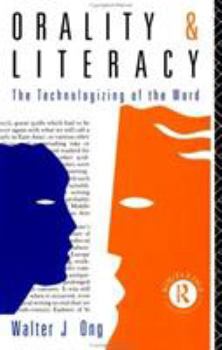Orality and Literacy
Select Format
Select Condition 
Book Overview
Walter J. Ong's classic work provides a fascinating insight into the social effects of oral, written, printed and electronic technologies, and their impact on philosophical, theological, scientific... This description may be from another edition of this product.
Format:Paperback
Language:English
ISBN:0415027969
ISBN13:9780415027960
Release Date:October 1982
Publisher:Routledge
Length:216 Pages
Weight:0.60 lbs.
Dimensions:0.7" x 5.1" x 7.7"
Related Subjects
Communication Communication & Journalism Communications Criticism & Theory Education & Reference History & Criticism Language Arts Literary Criticism Literary Criticism & Collections Literary Theory Literature Literature & Fiction Movements & Periods Poetry Reference Textbooks Words, Language & GrammarCustomer Reviews
5 ratings
Orality and Literacy
Published by Thriftbooks.com User , 15 years ago
Great, clearly written. This is a classic! Wonderful quotes: "More than any other single invention, writing has transformed human consciousness."
Thought provoking, Challenging, Insightful
Published by Thriftbooks.com User , 16 years ago
Back when I was in college, one of my professors recommended this book to me. Ten years later, after skimming portions of it through several times, I read it through and discovered how important of a work it is. I would highly recommend it to anyone studying primary oral cultures and traditions. Walter Ong approaches one of the central topics for developing a wholistic understanding of older mythic traditions-- the linguistic, semiotic, and cognative differences which separate oral and literate traditions. The book begins by discussing the works dedicated to determining the origins of Homer's epics in the 20th century and the discovery of the extent to which the constraints of orally-transmitted knowledge structured the epics. Ong then summarizes additional research done in linguistic and anthropology fields relating to oral traditions in modern Europe, Africa, and elsewhere. Ong succeeds in creating an accessible outline of the major transitions in human thought from orality to chirography (manuscripts), from chirography to typography (with the widespread use of the printing press), and the resurgence of some aspects of orality in modern electronic communication (both personal and mass-market). This book is important for a number of reasons. First, it can help us to step back and be more conscious of how communications media are affecting how we communicate and, more importantly, how we think. Secondly it provides a framework for a better understanding of the older traditions in our past. Such understanding can provide a framework for better assimilating aspects of past approaches and thought processes into the present world. Although published first in 1982, the work has been reprinted numerous times and is still in print. It is a classic in its field and I would highly recommend it.
Stop reading and listen to this!
Published by Thriftbooks.com User , 18 years ago
I wish I hadn't read this book... but heard it, for this is a book that deserves the delight that comes from the immediate business of listening to sounds in the air rather than the abstracted business of reading marks on a page (or dulled spots on a screen). In it, Walter Ong makes a valiant attempt to take us back to a time before text, to a place where we might imagine language as something heard and existing only in its moment, language as something without thee concept of words and letters to chop it up, language as something we hear without imagined structures learned from print, language as something replete with revealing repetitions to aid memory and understanding, something that values the familiar over the novel. He then slowly winds us forward, textual innovation by [con]textual innovation, to the edge of the cyber age, the next unwritten chapter along this vast track. If you're a reader of books, I'm sure you'll be transported by this adventure beyond your cultural assumptions of what language is and can be. You may find yourself yearning for some of the human experience our world of convenient published accessible text may be denying us, or even hoping some of that experience is still available in specialist forms such as live performance, as I do. Either way, you'll never hear a book like it.
Little-heeded Thinker
Published by Thriftbooks.com User , 19 years ago
This book represents a very concise, easy to read summary of much of Ong's work in the area of human communications and technology. The depth of scholarship evident can easily be followed upon by using the wide-ranging bibliography. Ong masterfully takes the idea of the power of the alphabet, and points to the impact this has on human understanding, an impact which has not fully been accepted in philosophy, history, anthropology, sociology, etc. The student and scholar would do well to creatively interact with Ong's work.
Writing restructures consciousness
Published by Thriftbooks.com User , 23 years ago
"Sparsely linear or analytic thought and speech is an artificial creation, structured by the technology of writing." "Alienation from a natural milieu can be good for us and indeed is in many ways essential for full human life. To live and to understand fully, we need not only proximity but also distance." A guide to the transition between orality and literacy, the book deepens our understanding of our literary culture. Readers interested in the ways technologies affect our thought processes should read this book.





